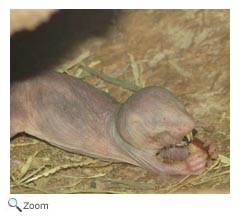Bathyergidae - mole rats
 There are fifteen species in this family found in Sub-Saharan Africa. They live in burrows in the ground. They have long, cylinder-shaped bodies; short legs; and small eyes and ears. Most species have loose skin that makes it easy for them to move forwards or backwards in underground tunnels! They do most of their tunnel digging with their
incisors
and use their feet to move the dirt out of their way. Most species are solitary. They eat roots and tubers. There are fifteen species in this family found in Sub-Saharan Africa. They live in burrows in the ground. They have long, cylinder-shaped bodies; short legs; and small eyes and ears. Most species have loose skin that makes it easy for them to move forwards or backwards in underground tunnels! They do most of their tunnel digging with their
incisors
and use their feet to move the dirt out of their way. Most species are solitary. They eat roots and tubers.
World Status Key
 Least Concern Least Concern  Near Threatened Near Threatened  Vulnerable Vulnerable  Endangered Endangered
 Critically Endangered Critically Endangered  Extinct in the Wild Extinct in the Wild  Extinct Extinct
Status taken from ICUN Redlist. If no status is listed, there is not enough data to establish status, or there is no status data for the species.
US Status Key
 Threatened in US Threatened in US  Threatened in NH Threatened in NH  Endangered in US Endangered in US  Endangered in NH Endangered in NH  Breeds in NH Breeds in NH  Introduced Introduced
Status taken from US Fish and Wildlife and NH Fish and Game
New Hampshire Species |
|
North/Central American Species |
| None |
|
None
|
Additional InformationKey:  Profile Profile  Photos Photos  Video Video  Audio Audio
African Mole Rat - Cryptomys hottentotus    
Common mole rats are found in southwestern Cape Province, South Africa.
Source: Animal Diversity Web Intended Audience: General Reading Level: Middle School
Cape Mole Rat - Georychus capensis    
Cape mole rats are found in the southwestern and southern parts of the Cape of Good Hope Province in South Africa
Source: Animal Diversity Web Intended Audience: General Reading Level: Middle School
Damaraland Mole Rat - Cryptomys damarensis    
The Damaraland mole rat lives in underground colonies with as many as 40 individuals.
Source: Arkive Intended Audience: General Reading Level: Middle School
Damaraland Mole Rat - Cryptomys damarensis    
Damaraland mole rats live in southwestern and central Africa, mostly in Botswana and West Zambia.
Source: Animal Diversity Web Intended Audience: General Reading Level: Middle School
Naked Mole Rat - Heterocephalus glaber    
The naked mole rat is found in East Africa in parts of Kenya, Ethiopia and Somalia.
Source: Arkive Intended Audience: General Reading Level: Middle School
Naked Mole Rat - Heterocephalus glaber    
The naked mole rat has hairs between its toes that allow its feet to work like brooms to sweep away soil.
Source: Animal Diversity Web Intended Audience: General Reading Level: Middle School
Naked Mole Rat - Heterocephalus glaber    
The naked mole rat is not completely naked. It has around 100 hairs that it uses like whiskers to help feel its way around underground.
Source: San Diego Zoo Intended Audience: Students Reading Level: Elementary/Middle School
Naked Mole Rat - Heterocephalus glaber    
Naked mole rats are a little bit like ants! They live underground in a colony where there is one dominant rat—the queen, who is the only one who bears young.
Source: National Geographic Intended Audience: General Reading Level: Elementary/Middle School
Naked Mole Rat - Heterocephalus glaber    
The queen naked mole rat can produce up to four litters a year, each with between 12 and 27 pups in a litter.
Source: Bristol Zoo Intended Audience: Students Reading Level: Elementary/Middle School
Naked Mole Rat - Heterocephalus glaber     
Naked mole rats can live up to 17 years in the wild.
Source: Philadelphia Zoo Intended Audience: Students Reading Level: Elementary/Middle School
Naked Mole Rat - Heterocephalus glaber     
Naked mole rats are radicivores, meaning that they eat primarily eat tubers. One large tuber can feed an entire colony for years.
Source: Zoo Atlanta Intended Audience: Students Reading Level: Elementary/Middle School
Zambian Mole-rat - Cryptomys anselli   
The Zambian mole-rat is found in Zambia and the Democratic Republic of the Congo.
Source: Arkive Intended Audience: General Reading Level: Middle School
Zambian Mole-rat - Cryptomys anselli   
The Zambian mole-rat lives and forages underground.
Source: World Association of Zoos and Aquariums Intended Audience: General Reading Level: High School |

